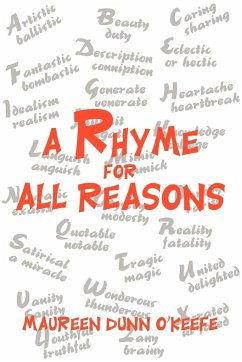Frogs, Frags, and Kisses delights in wordplay and wisdom. Each of its more than two hundred very short poems showcases Müller's wit, depth, and inner struggles. From tanka to limericks, and haiku to little fragments, this author sees the big in the small, the meaning in the prosaic, and the humor in the tragedy. A wonderful compendium of the small, this book will delight with its miniature portraits of a life keenly observed; from sleepless nighttime hours, to pearls of perception, to the naughty thoughts of moguls, artists, scholars or vagabonds. A book to savor and enjoy, in big bites or small.
Hinweis: Dieser Artikel kann nur an eine deutsche Lieferadresse ausgeliefert werden.
Hinweis: Dieser Artikel kann nur an eine deutsche Lieferadresse ausgeliefert werden.








![A Forest Insect Alphabet [With CD (Audio)] A Forest Insect Alphabet [With CD (Audio)]](https://bilder.buecher.de/produkte/36/36130/36130492m.jpg)